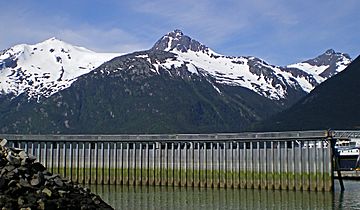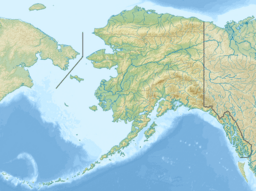Mount Harding (Alaska) facts for kids
Quick facts for kids Mount Harding |
|
|---|---|

Northeast aspect, from Skagway
(Lactic Acid Peak to left) |
|
| Highest point | |
| Elevation | 5,321 ft (1,622 m) |
| Prominence | 821 ft (250 m) |
| Isolation | 1.07 mi (1.72 km) |
| Parent peak | Lactic Acid Peak (5,380 ft) |
| Geography | |
| Location | Tongass National Forest Skagway Borough Alaska, United States |
| Parent range | Coast Mountains Boundary Ranges |
| Topo map | USGS Skagway B-2 |
Mount Harding is a tall mountain peak in Alaska, United States. It stands about 5,321 feet (1,622 meters) high. This mountain is part of the Boundary Ranges within the larger Coast Mountains. You can find it about 4.5 miles (7.2 km) southwest of Skagway.
Even though it's not the highest mountain, Mount Harding rises very steeply. It climbs 5,300 feet (1,615 meters) from the Taiya Inlet in less than 2 miles (3.2 km). This makes it look very impressive from below.
The mountain was named in 1924 by the Skagway Alpine Club. They chose the name to honor Warren G. Harding, who was the 29th President of the United States. President Harding visited Skagway on July 11, 1923. He was the only president to ever visit Skagway. Sadly, he passed away just three weeks later. The mountain's name became official in 1986. Water from Mount Harding flows into the Taiya Inlet to the east and the Ferebee River to the west.
What's the Weather Like on Mount Harding?
Mount Harding has a subarctic climate. This means it has very cold, snowy winters. The summers are usually cool.
Weather systems from the Gulf of Alaska hit the Coast Mountains. The mountains force the air upwards. This process, called orographic lift, causes a lot of rain and snow to fall.
Temperatures on the mountain can drop below −20 °C (−4 °F). With wind, it can feel even colder, sometimes below −30 °C (−22 °F). Because of this cold climate, there is a glacier south of the summit. A smaller glacier is also found on the northwest side.
If you want to see or climb Mount Harding, the best time to visit is from May through July. The weather is usually most favorable during these months.
Images for kids
 | Claudette Colvin |
 | Myrlie Evers-Williams |
 | Alberta Odell Jones |



